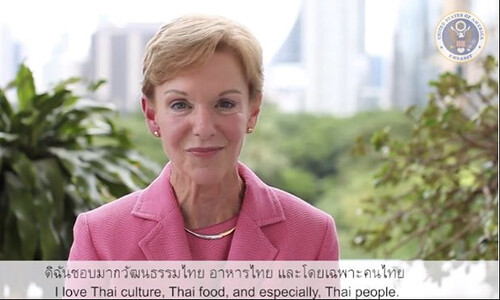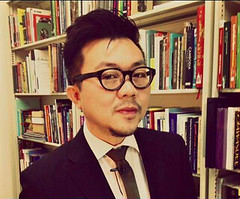
Kristie Kenney, US Ambassador to Bangkok, saying goodbye to Thailand.
Kristie Kenney, US Ambassador to Bangkok, gave a farewell to Thailand and is on her way back to Washington DC. She was in this position for much longer than the normal term of 3 years, raising a question if there might be problems within the US internal politics. But Thailand is not the only country where the US diplomatic mission will be without its ambassador. The vacancy in such an important position could be detrimental to the US foreign policy at this critical time in international politics.
In the case of Thailand, the fact that the United States will not immediately dispatch a new ambassador to station at its embassy could be intepreted in many ways. But it needs to be noted that the absence of the US ambassador in Bangkok does not mean that the United States has downgraded its relationship with Thailand. The appointment of chargé d’affaires, who is usually a deputy chief of mission and who will represent the United States in lieu of the ambassador, is a normal practice in many embassies in the world.
For example, the Thai Foreign Ministry could nominate the deputy chief of mission to assume the post of chargé d’affaires until the new ambassador officially receives an agrément from the host country. Thus, referring back to the US Embassy in Bangkok, the missing ambassador may be the result of a technical problem, rather than solely a bilateral political issue.
As mentioned earlier however, the Thai case deserves a closer look. Since the coup of May 2014, the United States has been obliged to impose soft sanctions against the coup makers according to its own internal laws. US Secretary of State John Kerry released a statement in the aftermath of the coup expressing his disppointment in democratic desruption and urged the junta to return power to the Thais quickly.
Subsequently, the United States suspended US$4.7 million worth of financial assistance to the Thai army. It also excluded Thailand from the Rim of Pacific Exercise (RIMPAC), a joint naval exercise in the Asia-Pacific region, which took place in July this year. At this point, it is unclear if the United States will send an invitation to Thailand to join the annual joint military exercise under the codename Cobra Gold.
Early reports seemed to suggest that the exercise could instead be moved to Australia. Cobra Gold represents an important hallmark in the US-Thai relations, being the largest and longest running military exercise in this region. All these may indicate that the United States may not be satisfied with the pace of political reforms at the hands of the Thai junta.
Many in Thailand have therefore explained the US decision not to send its ambassador as a symbol of disapproval of the military government. Again, one must look at politics in Washington DC to understand the difficuties facing the US State Department. Currently, the Barack Obama administration is unable to dispatch ambassadors to the US diplomatic missions in more than 50 countries, including Turkey, Sierra Leone and some 9 Eastern European nations.
Appointment of ambassadors has become a politicized issue in the United States. The Republicans claimed that President Obama has handpicked his own political allies to serve as ambassadors at the expense of the career diplomats. The claim soon turned out to be a major obstacle that puts off the dispatch of US ambassadors to station overseas. And this will cost the United States its national interests in many countries.
Today, the United States has continued to encounter significant challenges, from a security threat from the ISIS in Iraq and Syria, the civil war in Ukraine, the instability on the Korean Peninsular, the economic and military rise of China to the threat of non-traditional security, such as natural diasaters and pandemics. The spread of Ebola in Africa has the potential to threaten the US interests in that continent as well as on its own soil.
In Southeast Asia, the US Embassy in Bangkok is not the only post without its ambassador. The US Embassy in Vietnam is coping with the same problem. Ted Osius has been nominated the US envoy to Hanoi since May but is still unable to travel there and assume his position. Republican Senators accused the Obama government of relaxing its armed sanctions against Vietnam in exchange for narrow economic benefits.
Since Obama took office, he was keen to restrengthen ties with Southeast Asia, a region that had long been out of the US strategic focus. The indifferent US attitude towards Southeast Asia was evident in the past in the American leaders’ failure to attend a number of ASEAN meetings over the years. Admittedly, the United States recognized that its interests mainly lied in the Middle East, Europe, or East Asia, including China, Japan and Korea.
But owing to the rise of China in recent years, Soutehast Asia has begun to attract the US foreign policy makers. Furthermore, the territorial conflicts in the South China Sea has greatly worried the United States of a possible blockage of navigation which will directly affect American interests. Lately, the United States has appeared to shift its policy towards Southeast Asia, to correspond with its new policy of Pivot to Asia.
A rapproachement policy was on its way. In 2008, the United States signed ASEAN’s Treaty of Amity and Cooperation, which allows it to participate in the East Asia Summit. Around the same time, US Secretary of State Hilary Clinton produced a discourse of a “Pacific Power”. Finally, the United States has returned to its home in the Pacific.
Hence, today, the delay in installing its ambassadors to countries like Thailand and Vietnam only contradicts the US vision and policy of Pivot to Asia in promoting longlasting and sustainable relationship with its key partners in the region. This will provide an excellent opportunity for China to entrench its influence in Southeast Asia more conveniently.

Pavin Chachavalpongpun is associate professor at Kyoto University’s Center for Southeast Asian Studies.

Since 2007, Prachatai English has been covering underreported issues in Thailand, especially about democratization and human rights, despite the risk and pressure from the law and the authorities. However, with only 2 full-time reporters and increasing annual operating costs, keeping our work going is a challenge. Your support will ensure we stay a professional media source and be able to expand our team to meet the challenges and deliver timely and in-depth reporting.
• Simple steps to support Prachatai English
1. Bank transfer to account “โครงการหนังสือพิมพ์อินเทอร์เน็ต ประชาไท” or “Prachatai Online Newspaper” 091-0-21689-4, Krungthai Bank
2. Or, Transfer money via Paypal, to e-mail address: [email protected], please leave a comment on the transaction as “For Prachatai English”
